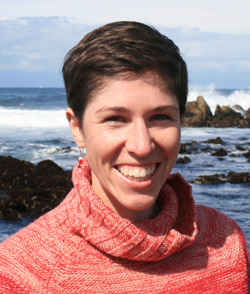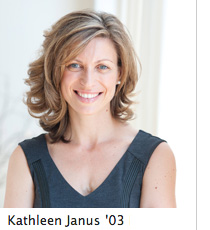
By Andrew Cohen
As the first recipient of the International Human Rights Law Clinic’s new summer fellowship, Katie Lynn Anderson ’15 wasted no time showing why she was chosen. With the ink on her final exams barely dry, she dived right into a busy internship at Pangea Legal Services in San Francisco.
“Within a week, I was asked to do all kinds of work to support Pangea’s mission of helping immigrant communities,” Anderson said. “I was in Sacramento lobbying for immigrant-friendly bills, in court working on deportation defense cases, and in the office developing training and education programs. It’s been a whirlwind, and a very positive experience.”
Anderson was chosen for the fellowship by a committee of International Human Rights Law Clinic (IHRLC) alumni that reviewed applications. Launched by a $10,000 anchor gift from former clinic student Kathleen Janus ’03 and her husband, Ted Janus, the IHRLC Alumni Summer Fellowship aims to provide valuable training for select Berkeley Law students during the summer after their second year. Anderson will receive a $5,000 stipend for her summer work.
“When I was a law student, the clinic gave me so many tools to be an effective lawyer and to make a real difference in people’s lives,” Kathleen Janus said upon launching the fellowship. “The hands-on experience and strong mentoring I received there transformed the way I approached the practice of law.”
Janus teaches International Human Rights at Berkeley Law and serves on the boards of the law school’s alumni association and Human Rights Center. She is a co-founder of Spark, a network of millennial philanthropists that aims to increase both investment in women’s organizations and the number of young people who give to women’s causes. It has grown to more than 10,000 people worldwide who have collectively raised over $1.5 million to promote gender equality.
 With continued donations augmenting the Janus’ gift, IHRLC leaders hope to fund multiple fellowships that enable students to work with some of the clinic’s partner organizations.
With continued donations augmenting the Janus’ gift, IHRLC leaders hope to fund multiple fellowships that enable students to work with some of the clinic’s partner organizations.
“Our over-arching goal is to provide students with opportunities for real-word experience in human rights advocacy,” clinic instructor Allison Davenport ’04 said. “Depending on the amount of future donations and number of future applicants, the fellowship may expand to two students per year going forward. Human rights law is a tough field to break into, and we want to give our committed students every possible advantage.”
Starting early
As a first-year student, Anderson tackled human rights projects almost immediately. She worked with the California Asylum Representation Clinic—one of the law schools’ Student-Initiated Legal Services Projects. Last summer, she interned at the California Appellate Project assisting counsel representing clients on death row, often working directly with clients to gather information and evidence for their habeas petitions.
Anderson joined IHRLC in the fall semester of her second year and worked on a year-long project to provide redress to victims of human rights violations stemming from internal armed conflict in India. In February, she traveled to Nepal with Guneet Kaur ’14, Ingrid Perez ’15, and clinic Director Laurel Fletcher to present their legal analyses on the right to compensation for harms endured. The clinic team met with scholars and lawyers to discuss how international and state laws might intersect to protect civilians, how to best promote the principles of a “right to remedy,” and how to enforce those rights.
“That trip contextualized the work I was doing,” Anderson said. “We’d been conducting a lot of legal research and at times the work felt abstract. But meeting with advocates working on the ground in India, it brought home how important human rights work is and how crucial it is for states to establish effective remedy mechanisms for victims.”
While looking for a summer internship with a group that advocated for marginalized populations in need of legal services, Anderson spoke to a former Pangea intern to find out more about the organization. Pangea’s strategy and mission aligned with Anderson’s values, as did its client-driven policy work with client-centered strategies.
“Human rights law is not an easy thing to navigate,” she said. “But that means there’s a lot of room for creative strategies and problem-solving to effectuate change. Pangea is a growing organization that relies on its two summer interns and treats us as if we were lawyers, while still providing key mentorship and support. I’m so grateful that this fellowship enabled me to work here.”